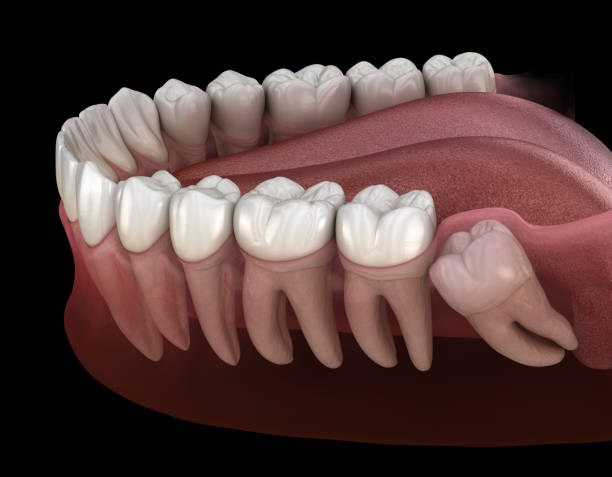Are you experiencing pain or discomfort in the back of your mouth? It may be time to consider wisdom tooth extraction. Wisdom teeth, also known as third molars, can cause a range of issues such as crowding, infection, and gum disease. While the thought of having a tooth removed can be daunting, it’s a common and routine procedure that can alleviate pain and prevent further dental problems. At Enfield Royal Clinic, we offer expert wisdom tooth extraction services to help you get back to your daily routine with ease.
Procedure Time
1 Hour
Downtime
2 - 3 Days
Back to Work
2 - 3 Days
Results
2 Weeks
What is Wisdom Tooth Extraction?
Wisdom tooth extraction is a dental procedure where one or more wisdom teeth are removed. Wisdom teeth are the third molars that grow in the back of your mouth, usually in your late teens or early twenties. Sometimes, these teeth can cause pain, infection, or damage to surrounding teeth, so they need to be removed.
It’s essential to follow your dentist’s instructions for post-operative care to avoid complications such as infection or dry socket, which can be painful. You’ll need to keep the area clean and avoid certain foods and activities for a few days after the procedure.
Wisdom tooth extraction is a dental procedure to remove problematic wisdom teeth. It’s done under local anesthesia and involves loosening and removing the tooth. Afterward, you’ll need to follow instructions for post-operative care to avoid complications.
When is Wisdom Tooth Extraction done?
Wisdom tooth extraction is typically done when there are problems with the wisdom teeth. These problems can include:
- Impacted wisdom teeth: This is when the tooth is unable to fully emerge from the gum line and can cause pain, infection, or damage to surrounding teeth.
- Overcrowding: Wisdom teeth can push against surrounding teeth, causing them to shift and become misaligned.
- Decay or gum disease: Wisdom teeth can be difficult to clean properly, leading to decay or gum disease.
- Cysts or tumors: In rare cases, wisdom teeth can cause cysts or tumors to form.
Your dentist or oral surgeon may also recommend removing wisdom teeth as a preventive measure, even if there are no current problems. This is because wisdom teeth can be difficult to clean and maintain, and may cause problems in the future.
What are the benefits of Wisdom Tooth Extraction?
There are several benefits of wisdom tooth extraction, including:
- Relief from pain and discomfort: Wisdom teeth can cause pain, swelling, and infection, which can be alleviated by removing them.
- Prevention of further damage: Impacted or misaligned wisdom teeth can cause damage to surrounding teeth, and removing them can prevent further damage from occurring.
- Improved oral hygiene: Wisdom teeth can be difficult to clean properly, which can lead to decay and gum disease. Removing them can improve overall oral hygiene and reduce the risk of future dental problems.
- Lower risk of cysts and tumors: In rare cases, wisdom teeth can cause cysts and tumors to form, which can be painful and require removal. Removing the wisdom teeth can lower the risk of these complications.
- Improved overall dental health: Removing problematic wisdom teeth can improve overall dental health and reduce the risk of future dental problems.
It’s important to discuss the benefits and risks of wisdom tooth extraction with your dentist or oral surgeon to determine whether the procedure is right for you.
How do we Know if we Need to get our Wisdom Teeth Removed?

There are several signs that indicate you may need to have your wisdom teeth removed. Here are some common signs to look out for:
- Pain or discomfort: If you experience pain or discomfort in the back of your mouth, it may be a sign that your wisdom teeth are causing problems.
- Swelling or infection: Swelling or infection in the gums or jaw area can indicate an issue with your wisdom teeth.
- Difficulty opening your mouth: If you have difficulty opening your mouth or experience jaw stiffness, it may be a sign of a problem with your wisdom teeth.
- Crowding or shifting of teeth: Wisdom teeth can push against other teeth, causing them to become misaligned or crowded.
- Decay or gum disease: Wisdom teeth can be difficult to clean properly, which can lead to decay or gum disease.
If you experience any of these symptoms, it’s important to consult with your dentist or oral surgeon to determine if wisdom tooth extraction is necessary. Your dentist may also recommend removing wisdom teeth as a preventive measure, even if there are no current problems.
What happens before Wisdom Teeth Extraction?
You will be referred to an oral surgeon by your dentist for a consultation. The surgeon will examine your wisdom teeth and take dental X-rays to identify their precise location during this appointment. They’ll also talk to you about your dental treatment alternatives. Depending on your particular needs, wisdom tooth extraction is often done under local anesthetic, IV sedation, or general anesthesia.
Any drugs, vitamins, or supplements you are currently taking should be disclosed to your surgeon. You should use this opportunity to ask any questions you may have regarding the operation.
Procedure of Wisdom Tooth Extraction

Anesthesia
The dentist or oral surgeon will give you a shot of local anesthesia to numb the area around the tooth. In some cases, you may receive general anesthesia to make you sleep during the procedure.
Incision
Once the area is numb, the dentist or oral surgeon will make a small cut in your gum tissue to reach the tooth.
Extraction
Using specialized instruments, the dentist or oral surgeon will gently loosen the tooth and remove it from the socket. Sometimes, the tooth may need to be broken into smaller pieces to make it easier to remove.
Cleaning and Stitching
After the tooth is removed, the dentist or oral surgeon will clean the area and may stitch the gum tissue to promote healing.
Recovery
You will be given instructions on how to care for the area after the procedure. You may experience some pain and swelling, but this can usually be managed with pain medication and ice packs.
It’s important to follow your dentist’s or oral surgeon’s instructions carefully to ensure proper healing and to avoid any complications.
Risks Involved
Like any medical procedure, there are potential risks and complications associated with wisdom tooth extraction. Here are some of the risks you should be aware of:
- Pain and swelling: Pain and swelling are common after wisdom tooth extraction, but they can usually be managed with pain medication and ice packs.
- Infection: Infection can occur after the procedure, but this is rare. Your dentist or oral surgeon will prescribe antibiotics if needed.
- Bleeding: Some bleeding is normal after the procedure, but excessive bleeding can occur in rare cases. If you experience heavy bleeding, contact your dentist or oral surgeon immediately.
- Nerve damage: Numbness or tingling in the lips, tongue, or cheeks can occur if the nerves near the wisdom teeth are damaged during the procedure.
This is rare, but it can happen. - Sinus complications: In rare cases, the removal of upper wisdom teeth can cause sinus problems or an opening between the mouth and sinus cavity.
Your dentist or oral surgeon will discuss these risks with you before the procedure and will take steps to minimize the risk of complications. It’s important to follow their instructions carefully and to report any unusual symptoms or complications promptly.
Aftercare
After wisdom tooth extraction, it’s important to take proper care of your mouth to promote healing and reduce the risk of complications. Here are some tips for aftercare:
- Bite on gauze: Your dentist or oral surgeon will provide you with gauze to bite down on after the procedure. This helps to stop the bleeding and promote clotting.
- Use ice packs: Applying ice packs to your cheeks can help to reduce swelling and discomfort.
- Avoid hard, crunchy, or sticky foods: Stick to soft, easy-to-eat foods for the first few days after the procedure to avoid irritating the extraction site.
- Avoid smoking and using straws: Smoking and using straws can dislodge the blood clot and delay healing, so it’s best to avoid them for at least 24 hours after the procedure.
- Take pain medication: Your dentist or oral surgeon may prescribe pain medication or recommend over-the-counter pain relievers to help manage pain and discomfort.
- Brush gently: Continue to brush your teeth, but be gentle around the extraction site.
- Rinse with salt water: Your dentist may recommend rinsing your mouth with salt water several times a day to help reduce swelling and promote healing.
- Follow up with your dentist: It’s important to follow up with your dentist or oral surgeon to ensure that the extraction site is healing properly and to address any concerns or complications.
By following these aftercare tips, you can help to promote healing and reduce the risk of complications after wisdom tooth extraction.
Recovery Time
The recovery time after wisdom tooth removal can vary depending on factors such as the number of teeth removed, the complexity of the procedure, and your individual healing ability. In general, most people can expect the following recovery timeline:
- The first few days after the procedure may involve some discomfort and swelling, which can be managed with pain medication and ice packs.
- By the end of the first week, most of the swelling should have subsided, and you may be able to resume normal activities.
- Within two weeks, the gum tissue should have fully healed, and any stitches that were used will likely dissolve or be removed.
- It may take up to several months for the bone tissue to fully heal and fill in the socket left by the extracted tooth.
During the recovery period, it’s important to follow your dentist or oral surgeon’s aftercare instructions and attend any follow-up appointments to ensure that the extraction site is healing properly. If you experience severe or prolonged pain, swelling, or bleeding, or if you develop signs of infection such as fever or pus discharge, contact your dentist or oral surgeon immediately.
Cost of Wisdom Teeth Extraction
Wisdom Teeth Extraction
Starting FromWisdom Teeth Extraction
StandardThe cost of wisdom tooth removal in Riyadh, Saudi Arabia can vary depending on factors such as the number of teeth being removed, the complexity of the procedure, and the dentist or oral surgeon performing the procedure. In general, the cost can range from approximately 1000 SAR to 1200 SAR.
Why Choose Us?
At Enfield Royal Clinic, we prioritize our patients’ comfort, safety, and satisfaction. Here are just a few reasons why you should choose us for your wisdom tooth extraction:
- Experienced professionals.
- State-of-the-art technology.
- Personalized care.
- Safe and comfortable environment.
- Affordable pricing.
Book an Appointment!
If you’re in need of wisdom tooth extraction, we invite you to book an appointment with us at Enfield Royal Clinic. We’re committed to providing you with the best possible care and ensuring your complete satisfaction with the results.
FAQs.
You may experience some discomfort during the procedure, but your dentist or oral surgeon will use anesthesia to numb the area and minimize any pain.
The length of the procedure depends on the number of teeth being removed and the complexity of the extraction. Typically, the procedure takes anywhere from 30 minutes to an hour.
You may need to avoid hard or crunchy foods and stick to a soft or liquid diet for a few days.
Wisdom teeth often need to be extracted for several reasons such as Lack of space, Impaction, Misalignment and Decay or gum disease.
The timing for wisdom tooth extraction varies from person to person. It is often recommended when they are causing pain or discomfort..
Relevant Treatments.

Dental Extraction
An X-ray of your tooth will be taken by your dentist before the procedure is scheduled. Tell your dentist about all prescription and over-the-counter medications you take, as well as any vitamins, dietary supplements, and...

Root Canal
Are you tired of suffering from persistent tooth pain that just won’t go away? It can be frustrating and downright miserable, especially when it interferes with your daily life. We understand how frustrating and uncomfortable this can be, which is why we...
Relevant Posts.

Wisdom Tooth Extraction Cost
Have you ever considered how much it would cost to get your Wisdom tooth extraction in Riyadh? It’s like solving a puzzle in dentistry! Imagine that the charges in these back teeth are..




